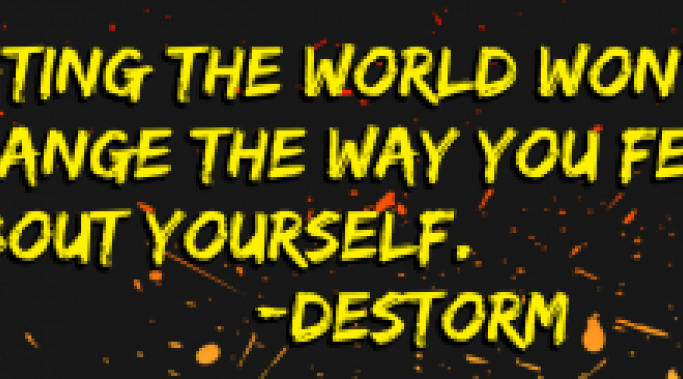The phrase “get over it” is something the mental health community has heard and spoken out against many times (What Is Stigma?). In particular, we hear it applied to depression and anxiety, but likely because those are the two mental illnesses that are most spoken about. The problem is, even though we’ve discussed the phrase and the problems it presents, it’s still something we hear over and over again, which, to me, means it’s something we need to continue speaking out against. "Get over it" just isn't helpful advice for a person with a mental illness.
Stigmatizing Words, Labels
Excoriation disorder is more than just a habit and words around it can stigmatize. Body-focused repetitive behaviors like excoriation (also called dermatillomania and skin-picking disorder) are more than bad habits one can break. The disease is difficult enough to deal with without the misunderstandings and stigma. Very few people know about this group of obsessive-compulsive related disorders (OCD) despite increased awareness efforts from within the body-focused repetitive behaviors (BFRB) community and even outside sources. It's important to remember that words can be stigmatizing and that excoriation is more than just a habit.
There’s no denying mental illness stigma is a year-round occurrence, but, sometimes, different points in the year make that stigma feel more poignant (What Is Stigma?). Summer is one of those times because it boasts good weather and longer days, and, typically, people encourage each other to be outside. It’s time to “enjoy the weather” so to speak, but that’s not always so easy. Summertime mental illness stigma can be a problem.
Language can stigmatize people with mental illness, and I am quite sensitive to noticing all of the words that seem to counteract society’s movement toward removing stigma for people who live with mental illness. Do you ever cringe when you hear the word "crazy" or "psycho?" I do. I feel that we have come so far in many respects in shaping our stigmatizing language for the good of many groups such as the terms, "gay," "retarded" or "lame," so why are we still so stigmatizing with language when it comes to mental illness?
As many walk by the people that inhabit the streets as a home, many of us consider that because someone is homeless that they must have a mental illness. I teach in the classrooms that this is not the case, but, ironically, it is the situation a lot of the time. As we are approached by people begging for change, wearing no pants, or screaming relentlessly in the streets, we are often correct in assuming that these individuals have significant mental health challenges.
Did you see that crazy guy on the sidewalk? Hear about that nutcase at the party last night?
We hear things like this all the time and rarely pay attention to them. After all, we’ve always been told that sticks and stones can break our bones, but names can never hurt us. Although it’s a nice thing to tell yourself when you’re a kid being bullied, the truth is that words hurt. And words that describe mental illness in such broad, often sensationalistic manner do a great deal of harm.
If you were once depressed and suffered symptoms of depression such as inability to concentrate, difficulty getting out of bed, irritability, low self-esteem and lessened joy in day-to-day activities, even when those symptoms disappear, you may continue to state that you still suffer from depression.
When you are bogged down with the flu, you will be besieged by a number of symptoms. Sore throat, digestive difficulties, headache, nausea and nasal congestion. But once you treat the flu, and the symptoms disappear, you wouldn’t consider yourself as still suffering from the flu.
I think it is important to remember that mental illness doesn’t need to be a life sentence. If Dr. Jill Bolte Taylor can essentially re-train her brain to repair itself after a major stroke, we should all be able to re-train our brains in a way as to allow us to battle, and overcome, mental illness.
There’s always been a double standard in mental health when it comes to schizophrenia. If you suffer from depression, are you a depressionist? Then why should a person who suffers from schizophrenia be a schizophrenic?
We need to stop the stigma of suicide to save lives. Otherwise, more people could buy a gun, put the barrel in their mouths and pull the trigger. Wrap a noose around their neck and push out the stool. Jump off a bridge into frigid water. Jump off of a building. Lay down on a train track. Purposefully inject themselves with a lethal dose of heroin. Take an entire bottle of certain prescription medications. There are tens of ways that people succeed at suicide every day. But how often do you hear about the awful truth? We must talk about the suicide, suicidal ideation and ways to end them to save lives.
If you are considering suicide, please call The National Suicide Prevention Line at 1-800-273-8255.









